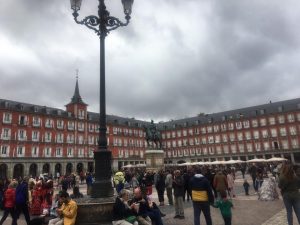 Estas últimas semanas Madrid, conocía como la “ciudad que nunca duerme” europea, se
Estas últimas semanas Madrid, conocía como la “ciudad que nunca duerme” europea, se 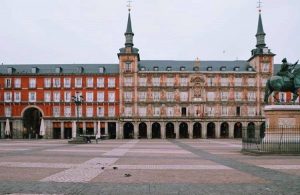 ha visto obligada a hibernar. Hemos visto desde nuestros balcones como las terrazas se despejan y la gente en las calles desaparece. Las persianas de las tiendas se bajaron, para no volver a abrirlas al día siguiente, y la atmósfera cambió completamente. Mientras los casos en Madrid se duplicaban de la noche a la mañana después de la marcha del 8 de marzo del Día Internacional de la Mujer, la gente comenzó a cuestionarse si el gobierno había tomado las medidas adecuadas para prevenir la propagación del virus. Apenas unos días después de esta manifestación, se les dijo a los empleados que empezaran a trabajar desde sus casas, y unos días más tarde, el país entró en un estado de emergencia de 2 semanas, donde se ordenó a todos que se aislaran en sus casas, todos los bares, restaurantes y teatros cerraron y la gente sólo puede salir para comprar comida, o medicinas. España se convirtió en el segundo país más infectado de Europa, después de Italia, y había hecho algo rápido para no terminar como Italia. Encerrar a todo un país no es una decisión facil, ya que sin duda tendrá enormes consecuencias sociales y económicas, con el número de casos superando los 10.000, no había muchas opciones.
ha visto obligada a hibernar. Hemos visto desde nuestros balcones como las terrazas se despejan y la gente en las calles desaparece. Las persianas de las tiendas se bajaron, para no volver a abrirlas al día siguiente, y la atmósfera cambió completamente. Mientras los casos en Madrid se duplicaban de la noche a la mañana después de la marcha del 8 de marzo del Día Internacional de la Mujer, la gente comenzó a cuestionarse si el gobierno había tomado las medidas adecuadas para prevenir la propagación del virus. Apenas unos días después de esta manifestación, se les dijo a los empleados que empezaran a trabajar desde sus casas, y unos días más tarde, el país entró en un estado de emergencia de 2 semanas, donde se ordenó a todos que se aislaran en sus casas, todos los bares, restaurantes y teatros cerraron y la gente sólo puede salir para comprar comida, o medicinas. España se convirtió en el segundo país más infectado de Europa, después de Italia, y había hecho algo rápido para no terminar como Italia. Encerrar a todo un país no es una decisión facil, ya que sin duda tendrá enormes consecuencias sociales y económicas, con el número de casos superando los 10.000, no había muchas opciones.
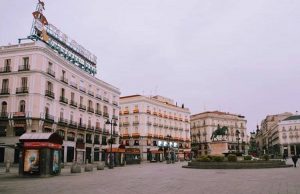
En todos los supermercados, las estanterías están en su mayoría vacías, y los vagones del metro, que suelen estar llenos de gente que va al trabajo, a la escuela o a socializar con los amigos, están vacíos, y los pocos que se atreven a seguir utilizando el transporte público, llevan máscaras y a veces guantes. Desafortunadamente, estas nuevas reglas de cuarentena no son posibles para algunos – médicos, enfermeras, trabajadores de tiendas, farmacéuticos y muchas más personas son necesarias ahora más que nunca. Como un acto de solidaridad, a las 10 de la noche todas las personas en España se asoman a sus balcones o se asoman a sus ventanas abiertas, para animar y aplaudir al personal médico y a cualquier otra persona que esté trabajando duro en este momento difícil e incierto, para mostrar su aprecio y apoyo.
Ahora que la UE cierra sus fronteras a los ciudadanos no comunitarios por primera vez desde su creación, lo que restringirá los viajes al continente, frenando la propagación del virus y mitigando sus efectos en el bloque, será interesante ver cómo cambia Europa. 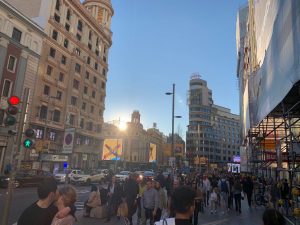 Madrid, que es una ciudad diversa y vibrante en la que se reúnen y se hacen amigos de todo el mundo, sin duda cambiará por un tiempo. Pero espero que pronto, cuando salga el sol del verano, las sillas y mesas se vuelvan a poner en las terrazas, los artistas callejeros vuelvan a bailar y la vida vuelva a las calles de Madrid.
Madrid, que es una ciudad diversa y vibrante en la que se reúnen y se hacen amigos de todo el mundo, sin duda cambiará por un tiempo. Pero espero que pronto, cuando salga el sol del verano, las sillas y mesas se vuelvan a poner en las terrazas, los artistas callejeros vuelvan a bailar y la vida vuelva a las calles de Madrid.
These past couple weeks Madrid, known as the European ‘city that never sleeps’, has been forced into hibernation. We have watched from our balconies as the terraces clear and the people on the streets disappear. Shutters on shops came down, to not be reopened the next day, and the atmosphere changed completely. As the cases in Madrid doubled overnight after the 8th of march international women’s day march, people began to question whether adequate measures were taken to prevent the spread of the virus. Just a few days after this march, employees were told to start working from home, and then just a few more days later, the country entered a 2 week state of emergency, where everyone was ordered to self-isolate at home, all bars restaurants and theatres shut and people are 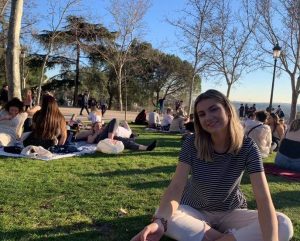 only able to leave to buy food, or medicine. Spain soon became the second most infected country in Europe, after Italy, and had do something quick as to not end up how Italy had. Putting a whole country into lockdown is not a decision that can be taken likely, as no doubt it will have huge social and economic consequences, with the number of cases rising above 10,000, there was little choice.
only able to leave to buy food, or medicine. Spain soon became the second most infected country in Europe, after Italy, and had do something quick as to not end up how Italy had. Putting a whole country into lockdown is not a decision that can be taken likely, as no doubt it will have huge social and economic consequences, with the number of cases rising above 10,000, there was little choice.
In every super market, the shelves are mostly empty, and the metro carriages, which would usually be heaving with people going to work, school or socialising with friends, are mostly empty, with the few who are daring to still use public transport, wearing masks and sometimes gloves. Unfortunately, these new quarantine rules are not possible for some- doctors, nurses, shop workers, pharmacists and many more people are needed more now than ever. As an act of solidarity, at 10pm every evening in Spain, people take to their balconies or lean out their open windows, to cheer and applaud the medical staff and anyone else who is working hard through this difficult and uncertain time, to show appreciation and support.
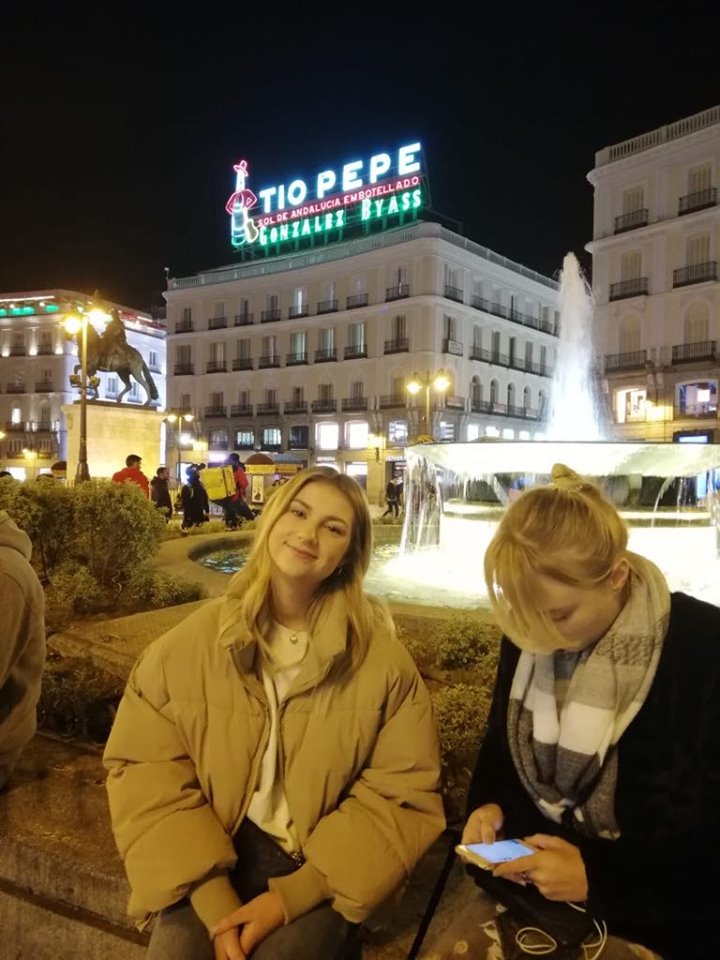
With the EU now shutting its borders for non-EU citizens for the first time since it was created, which will restrict travel into the continent, slowing down the spread of the virus and mitigating its effects on the bloc, it will be interesting to see how Europe changes. Madrid, which is a diverse and vibrant city where people from all over the world meet and become friends will undoubtedly changed for a while. But I hope soon, when the summer sun comes out, the chairs and tables will be put back on the terraces, the street performers will be dancing once more, and life will return to the streets of Madrid.
